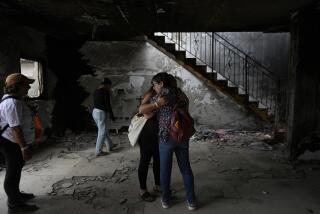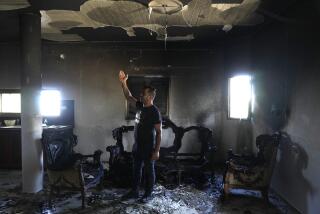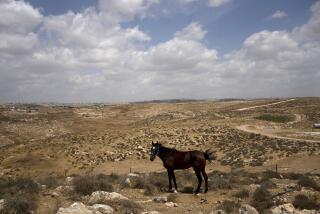In Militant Palestinian City, Israelis Celebrate New Settlements
- Share via
NABLUS, Israeli-Occupied West Bank — With a blend of religion and muscular nationalism Thursday, right-wing politicians celebrated the accelerated thrust of new Jewish settlements at a ceremony in Nablus, the largest and most militant Palestinian city in the West Bank.
Soldiers confined all 120,000 city residents to their homes to prevent local protests during the gathering. A small group of peace marchers from Israel was let into town to demonstrate against the settlement activity, which they called a “provocation.”
The politicians, some of whom may be instrumental in helping caretaker Prime Minister Yitzhak Shamir hold on to power, led the festivities at the traditional site of the Tomb of Joseph, a biblical prophet revered by Jews and Muslims. The tomb and synagogue stand at the edge of the Balata refugee camp, where West Bank Palestinians two years ago first joined the intifada that had begun days before in the Gaza Strip.
The government has made plans to set up a settlement nearby to house students of a yeshiva, or religious school. It would be the first settlement within the limits of Nablus and one of several approved by Shamir since a political crisis six weeks ago undid a coalition government, leaving his rightist Likud Party in sole control of the government.
Although only one building in Nablus is on the drawing boards, Palestinians believe that the settlement will expand into a full-scale neighborhood.
“First, they will come and build one place, then they will take land around and push us out,” said a local Palestinian resident.
Rabbi Yitzhak Ginsburgh, head of the yeshiva, rejected charges of provocation.
“What’s a provocation?” he asked rhetorically. “It’s a provocation to live in your own home?”
Dozens of yeshiva students have been studying at the tomb for the last few years, but the government had refused to let them live in Nablus.
Four of the yeshiva members face charges of killing a teen-age Palestinian girl last year when they attacked an Arab village. At the time, Ginsburgh raised a brief storm by defending the killing.
“It must be recognized,” he said then, “that Jewish blood and the blood of the non-Jew are not the same.”
On Thursday, at least 100 singing and chanting settlers and students danced and chanted as they carried new Torah scrolls to the tomb and synagogue. Dozens of soldiers armed with rifles looked on. At one point, the revelers lifted Rabbi Moshe Levinger, a militant settlement leader, above their shoulders.
Levinger was recently sentenced to five months in jail for the 1988 shooting death of a Palestinian shopkeeper in Hebron, on the West Bank. He has spearheaded new settlements in Hebron, the locale of another patriarchal shrine, the Tomb of Abraham.
Rehamam Ze’evi, who heads a small faction in the Parliament that favors the expulsion of Arabs from the occupied territories, said that Thursday’s celebration was narrowly religious and not political.
“You can present a Torah scroll in all parts of Israel. Why not here?” he asked.
A reporter asked Dov Shilansky, who is the Speaker of the Parliament and a member of Shamir’s Likud Party, about the need to confine all of Nablus indoors for the entire day. Shilansky responded by singing a religious song, “From Zion, the Torah will go forth . . . .”
Nearby, left-wing politician Yossi Sarid led 20 silent peace protesters. The Supreme Court overturned an army ban on his protest but limited the number of participants to 20.
“There is nothing religious about the ceremony. These people, whose political views are well-known, are only interested in provocation,” Sarid said.
Israel has built 140 settlements in the West Bank and Gaza Strip, housing 70,000 Israelis and a trickle of newly arrived Soviet immigrants. The Bush Administration views the building of settlements as reducing chances for compromise at proposed peace talks.
Shamir, who has long promoted settlement of the disputed land, said that Israel lacks enough money now to speed up construction of many more new settlements.
“To my great regret, because of the assignments before us, we can’t in the next two years engage in massive settlement,” he said.
Israel is looking to borrow millions of dollars for immigrant housing and is asking the United States to underwrite $400 million in loans.
Meanwhile, the opposition Labor Party appears to be splitting.
Shimon Peres, its leader, is under fire for being unable to form a government when given the chance last month.
On Thursday, Yitzhak Rabin, his chief rival within Labor, threatened to try to topple Peres if Likud holds onto power. Rabin said that his goal would be to bring on new elections.
More to Read
Sign up for Essential California
The most important California stories and recommendations in your inbox every morning.
You may occasionally receive promotional content from the Los Angeles Times.










